Guide to use a Customer Support Chatbot In 2024 + Top 5 Picks

Customer service chatbots are transforming how businesses connect with customers. These AI-powered tools provide instant responses and manage multiple queries at once.
Chatbots powered with AI learn from interactions, adapt to customer needs, and can even offer personalized suggestions.
This boosts the customer experience while freeing up your team to focus on more complex tasks.
Beyond their speed and intelligence, chatbots offer a cost-effective way to scale customer service.
You can reduce staffing costs and still provide excellent support, even during busy times, by automating routine tasks.
In this article, we'll explore the many uses of customer service chatbots and discover how they can impact your customer support.
We’ll also highlight the top chatbot tool that can help you scale your business, no matter how large your customer base grows.
What is an AI Customer Support Chatbot?#
A customer support chatbot helps businesses handle customer queries and issues around the clock. It uses artificial intelligence (AI), natural language understanding (NLU), and machine learning (ML) to understand and respond to customer service inquiries.
This chatbot can be embedded in websites, messaging apps, or social media platforms to provide instant support and assistance.
How Do Customer Support Chatbots Work?#
Customer support chatbots work by processing user inputs (questions or statements) and then responding based on pre-programmed rules or using more advanced AI.
Simple chatbots follow a script and reply to questions based on set rules, while more sophisticated ones can learn from interactions and improve their responses over time.
AI and Natural Language Processing (NLP)#
The key technology behind advanced chatbots is NLP. It enables a chatbot to understand human language in a way that goes beyond simple keyword matching.
It allows the bot to recognize context, intent, and the nuances of conversation.
For example, a customer may ask, "Where's my order?" or phrase it differently as, "Can you check the status of my package?" With NLP, the chatbot can understand that both requests are asking for the same information and respond accordingly.
The more sophisticated chatbots rely on ML to improve over time. Machine learning allows the chatbot to learn from past conversations, adjust its responses, and predict customer needs with greater accuracy.
It has a self-learning capability that, as more customers interact with the bot, improves its ability to handle a wider variety of questions.
Rule-Based vs. AI-Powered Chatbots#
There are two primary types of customer support chatbots:
Rule-Based Chatbots: These are basic bots that follow predefined paths based on the user's input. They work best for answering simple and common questions, such as store hours, shipping policies, or return procedures.
If a customer asks something beyond their programming, these bots will often prompt the customer to speak with a live agent.
AI-Powered Chatbots: These are more advanced and rely on AI and machine learning to provide intelligent responses. They can handle more complex customer requests, engage in longer conversations, and continuously learn from interactions to improve accuracy over time.
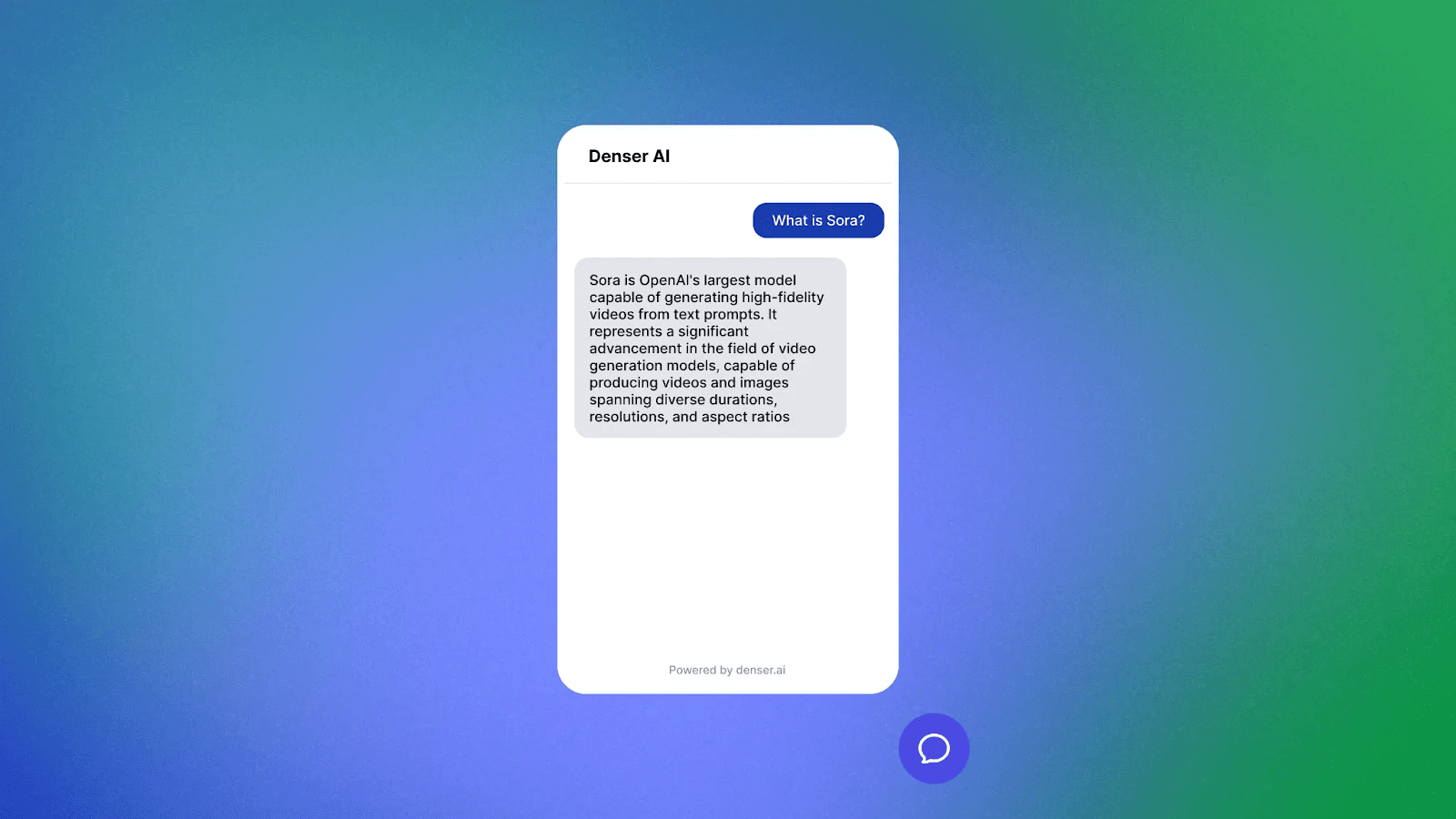
AI-powered chatbots also have the ability to interpret the customer's tone or sentiment, which allows them to adjust their responses more personalized.
Integration with CRM and Other Systems#
Customer support chatbots can integrate with various business systems, such as Customer Relationship Management (CRM) software, payment gateways, and e-commerce platforms.
This allows chatbots to provide accurate, real-time information based on customer history, account details, and product availability. For enterprise use cases, explore our B2B chatbot examples showing how companies like Oracle, IBM, and Salesforce integrate chatbots with their systems.
When a customer asks about order status, the chatbot can pull up the information directly from the company's order management system and respond, "Your package was shipped on September 5th and is expected to arrive on September 8th."
Benefits of Using AI Chatbots for Customer Service#
Customer support chatbots play a major role in modern customer service. With the rise of digital platforms, customer expectations have changed.
Businesses are now expected to provide fast, accurate, and reliable service around the clock. Chatbots help fulfill these expectations in several ways.
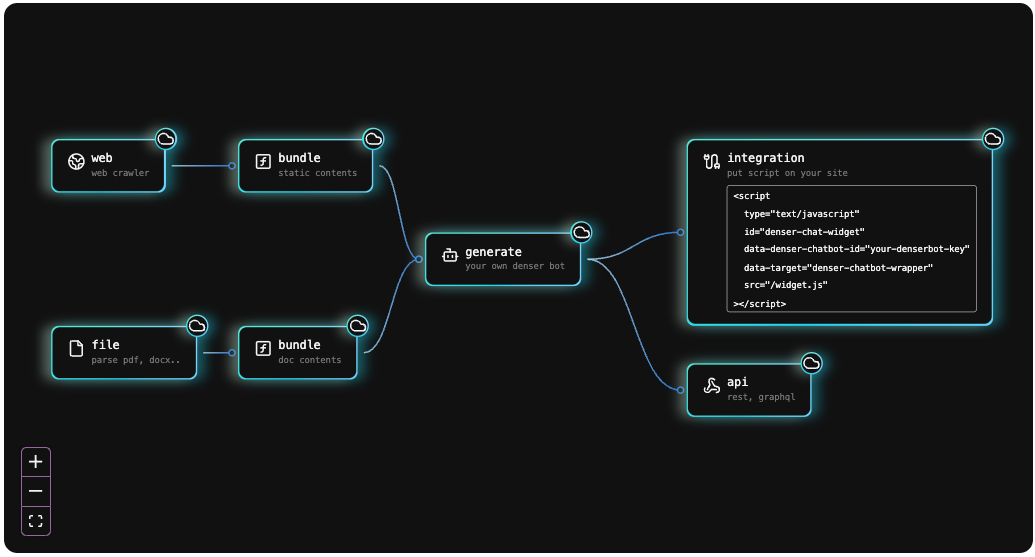
Using conversational AI chatbots for customer service brings many advantages. They help businesses provide better support, save money, and keep customers happy. Here are some key benefits:
24/7 Availability#
Unlike human agents, chatbots can answer customer inquiries at any time of day to ensure that customers always get help when they need it. For businesses comparing live chat tools, our guide on LiveChat alternatives covers the top options for 2026.
24/7 availability can directly impact customer satisfaction. For businesses, meeting this expectation is challenging without chatbots.
While human customer service agents are limited by working hours, chatbots ensure customers get quick answers to provide an optimal customer experience.
Cost Efficiency and Scalability#
Automating routine tasks like answering common questions can reduce operational costs for businesses.
For example, instead of hiring additional support staff during peak seasons, a chatbot can handle the increased volume of inquiries without requiring extra resources.
This makes chatbots highly scalable, as they can manage thousands of conversations simultaneously.
75% of customer support specialists agree that AI and automation tools can help them spend less time on manual tasks like data entry and scheduling meetings.
Reduction in manual tasks allows support teams to focus on more complex issues that require customer service reps.
Improved Customer Experience#
Chatbots do more than just reduce costs. Because they are available at any time, chatbots help reduce customer wait times, which is one of the biggest frustrations for customers.
Chatbots improve the overall customer experience by providing quick and accurate responses.
They can handle queries, provide recommendations, and even complete transactions for smooth and pleasant interactions.
Reduction in Human Error#
Humans are prone to making mistakes, especially when dealing with repetitive tasks or during high-pressure situations.
Chatbots, on the other hand, offer consistency in responses. They are programmed to give the same answers to similar questions every time, which reduces the likelihood of errors.
Handling Repetitive Queries#
Many customer service inquiries are repetitive, such as checking order statuses, answering product questions, or providing shipping details.
Chatbots are ideal for automating these repetitive tasks, freeing up human agents to focus on more complex or high-priority issues.
According to IBM, chatbots can handle up to 80% of routine customer queries. This reduces the workload on support teams and improves efficiency.
Customers also benefit from getting quick answers to their questions without needing to wait for human intervention.
Personalization#
Advanced AI chatbots can use customer data to provide personalized responses.
They remember past interactions and preferences, which makes the experience more relevant and engaging for the customer.
Data Collection and Insights#
Chatbots collect valuable data from customer interactions. This data can be analyzed to understand customer needs, preferences, and pain points, helping businesses improve their products and services.
Features to Look for in Customer Service Chatbots#
Choosing the right AI customer service chatbot for your business is crucial to ensuring it meets your customer service needs.
Here are the key features you should look for when selecting a support bot:
Natural Language Processing#
NLP allows chatbots to understand and interpret human language. A good support bot should be able to understand different ways of asking the same question and respond appropriately.
Multi-Channel Support#
Your chatbot should be able to operate across various platforms, such as your website, mobile apps, and social media channels.
This ensures that your customers can reach out through their preferred communication method.
Integration with Existing Systems#
The support bot should integrate smoothly with your existing systems, such as your customer relationship management (CRM) and helpdesk software.
It allows the bot to gather customer information and provide more personalized support.
Personalization Capabilities#
A good support bot should be able to personalize interactions based on customer data.
It can remember past interactions and preferences, making each conversation relevant and engaging for the user.
Analytics and Reporting#
The chatbot should come with robust analytics and reporting features. This helps you track performance metrics such as response time, resolution rate, and customer satisfaction.
Insights from these reports can help you continuously improve your customer service.
Easy Setup and Customization#
The chatbot should be easy to set up and customize according to your business needs.
You should be able to design conversation flows, update responses, and make adjustments without extensive technical knowledge.
Security and Privacy#
Security is crucial, especially when dealing with customer data. Ensure the support bot uses strong encryption and complies with data protection regulations.
Multilingual Support#
If your business serves a global audience, the chatbot should be able to handle multiple languages. It ensures that all your customers receive support in their preferred language.
Proactive Support#
Advanced chatbots can offer proactive support by identifying common issues and providing solutions before customers ask. It can significantly improve the user experience.
Continuous Learning#
AI-driven chatbots should be able to learn from every interaction and improve over time. This ensures the bot becomes more accurate and effective as it handles customer queries.
5 Best Customer Service Chatbots for 2024#
Selecting the best customer service chatbot can improve your business's efficiency and customer satisfaction.
Here are the top five customer service chatbots for 2024 that you should consider:
1. Denser.ai#
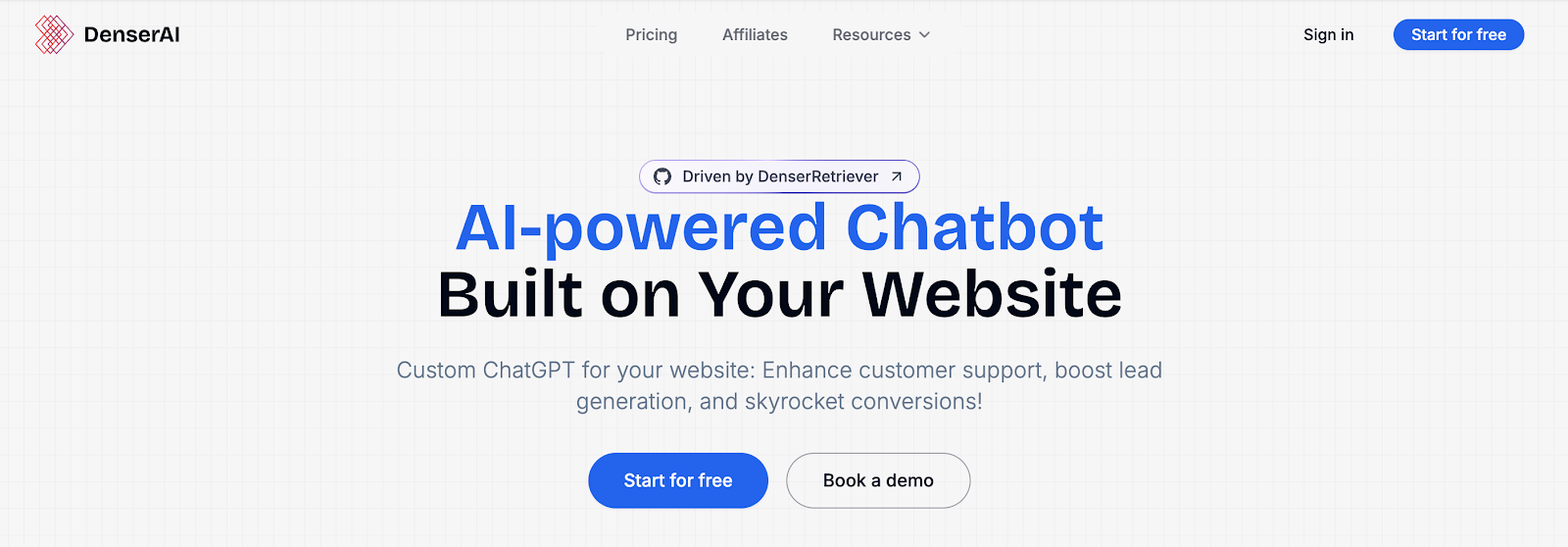
When it comes to delivering exceptional customer service through automation, Denser.ai stands above the rest.
Powered by advanced AI capabilities and designed with ease of use in mind, Denser.ai offers an unbeatable combination of intelligence and simplicity.
Key Features That Set Denser.ai Apart:#
- Accurately understands and responds to customer queries
- Works seamlessly across your website, app, and social media
- Connects with your CRM and helpdesk for personalized support
- Delivers tailored answers based on customer history
- Tracks performance and customer satisfaction
- Anticipates customer needs and offers help before they ask
If you're looking to experience its capabilities, Denser.ai offers a free plan that lets you explore the platform with no upfront cost. Here’s what you get:
- 1 DenserBot
- 200 queries
- Space for 100 webpages or 50MB of documents
Denser.ai also provides flexible pricing options designed to meet the needs of businesses of all sizes, from growing startups to large enterprises.
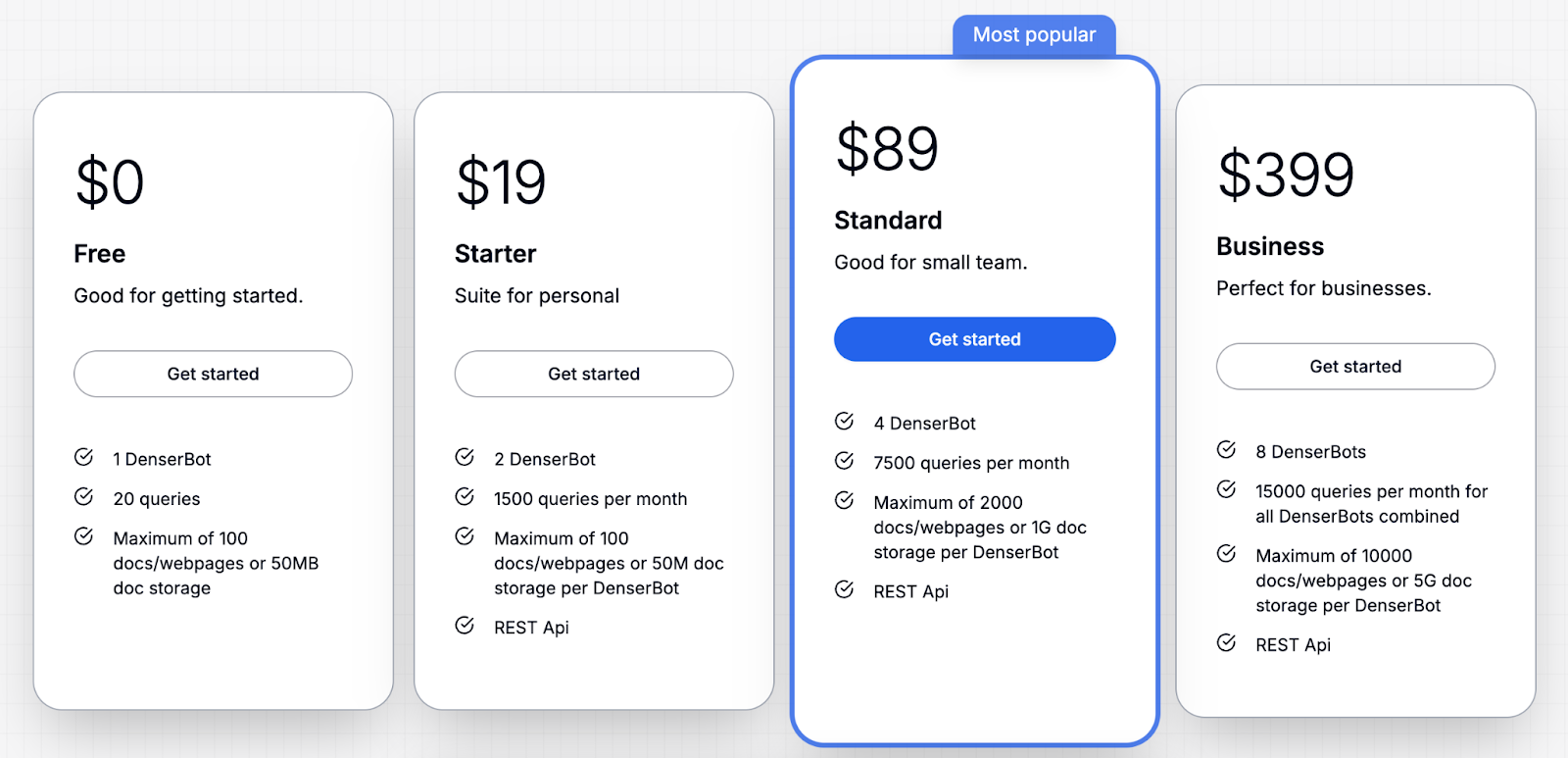
For individuals or small startups, the Starter Plan is available at $19 per month, offering 2 DenserBots and up to 1,500 queries per month—ideal for those who need more functionality without breaking the bank.
If you're part of a small team and need more advanced capabilities, the Standard Plan at $89 per month provides 4 DenserBots and supports up to 7,500 queries per month.
For larger businesses with higher demands, the Business Plan at $799 per month offers a full suite of features, including 8 DenserBots and 15,000 queries per month to handle larger volumes.
Sign up for a free trial or schedule a demo today with Denser.
2. Chatfuel#
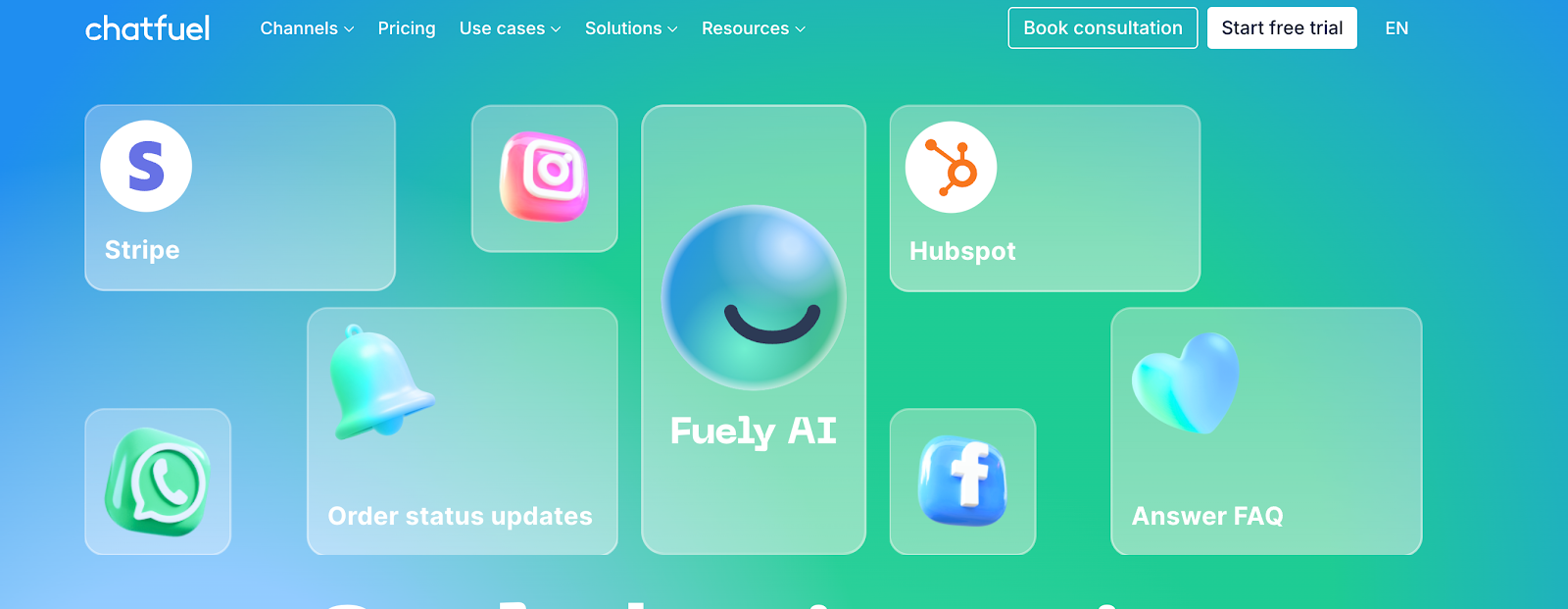
Source: Chatfuel
Chatfuel is known for its simplicity and extensive integration options, making it ideal for businesses looking to deploy chatbots quickly.
Pros
- User-friendly drag-and-drop interface
- Seamlessly integrates with various tools such as CRM and email marketing platforms
- Operates on platforms like Facebook Messenger and your website
Cons
- Less flexibility for creating highly customized bots
- Provides only basic analytics
- Primarily rule-based, it may struggle with complex queries
3. ManyChat#

Source: ManyChat
ManyChat excels in marketing automation and customer engagement, particularly on social media platforms.
Pros
- Advanced tools for lead generation and customer engagement
- Works on Facebook Messenger, Instagram, and SMS
- Easy to set up and use, with a focus on marketing functionalities
Cons
- More focused on marketing rather than AI-driven customer support
- Integration options are somewhat limited compared to other platforms
- It can become expensive as you scale up and add more features.
4. Tars#
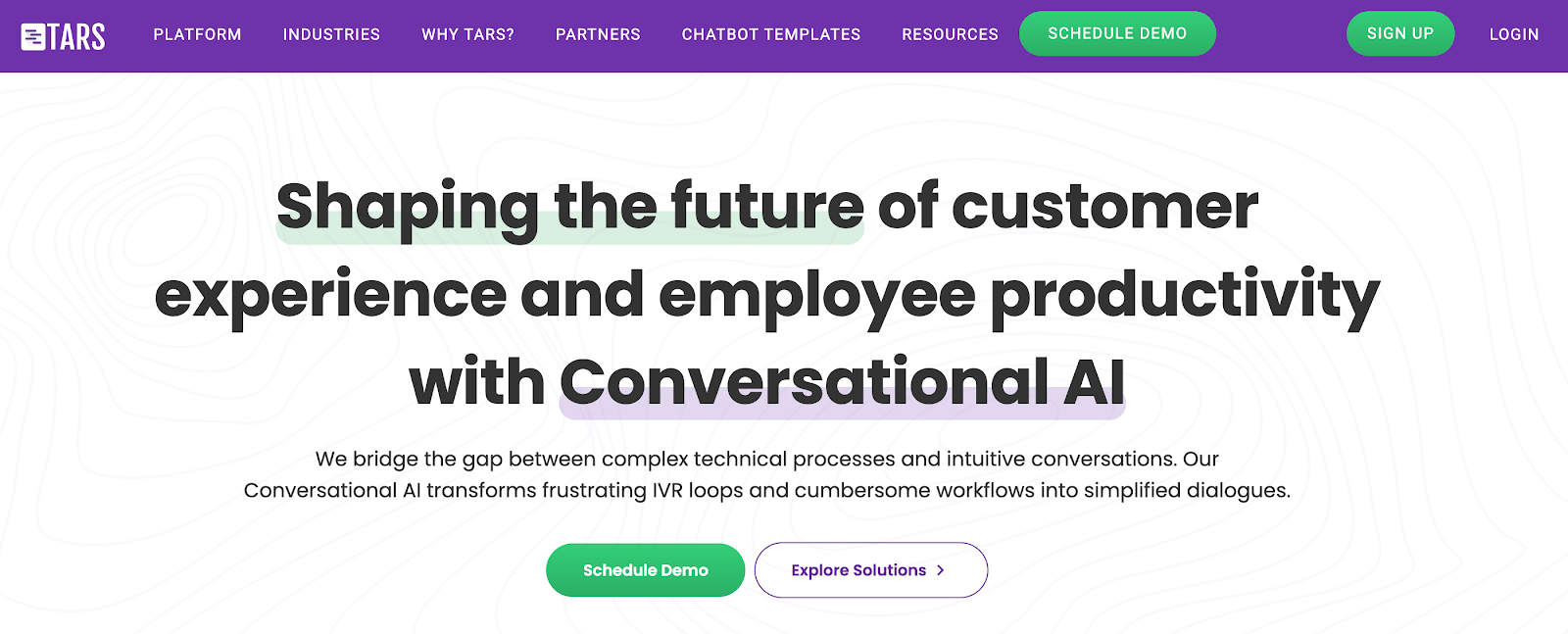
Source: Tars
Tars focuses on creating conversational landing pages, which are perfect for lead generation and customer support.
Pros
- Conversational landing pages for user engagement and conversion rates
- User-friendly interface allows for quick setup and deployment
- Available on websites and messaging platforms
Cons
- Lacks some of the advanced AI and NLP capabilities
- Offers only basic insights into user interactions
- Limited options for highly customized interactions
5. Intercom#
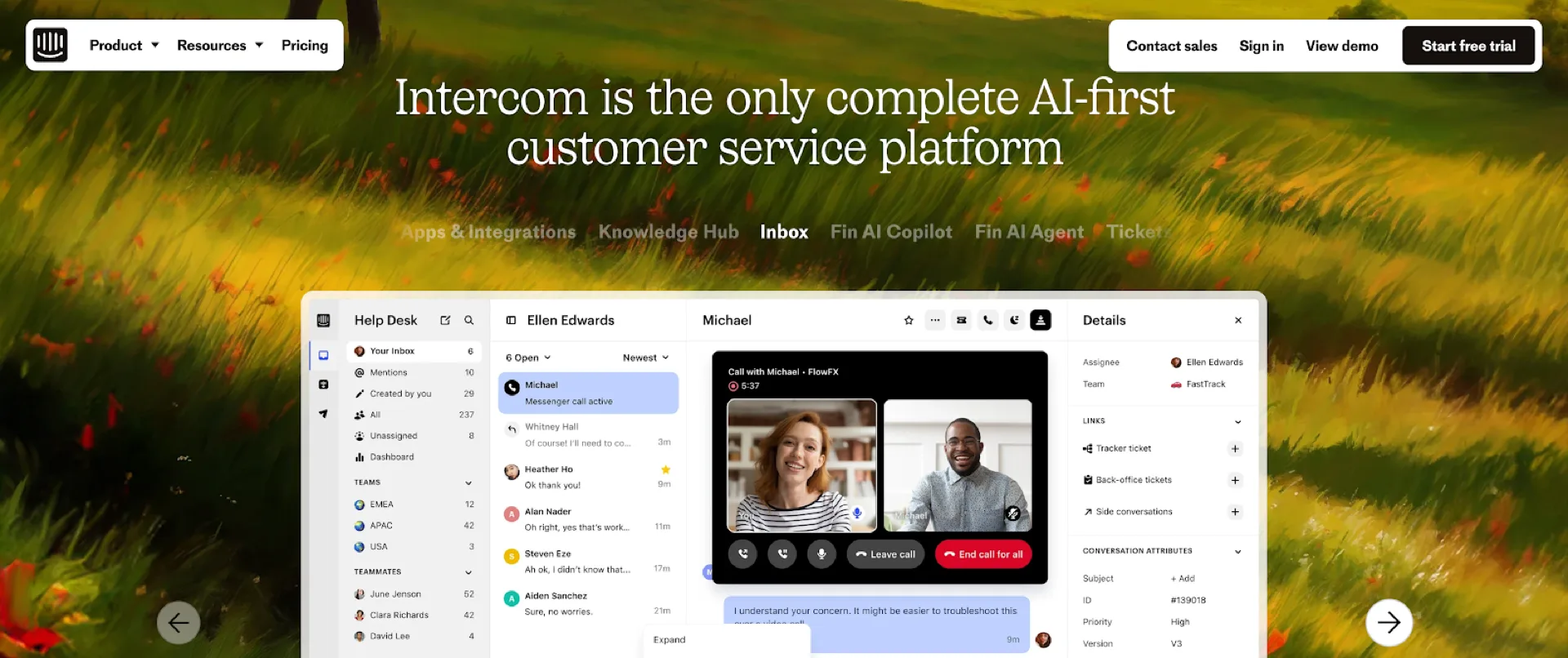
Source: Intercom
Intercom combines live chat and chatbot features, providing a versatile customer messaging platform suitable for businesses of all sizes.
Pros
- Combines live chat and chatbot features
- Operates across the web, mobile apps, and social media
- Provides detailed insights into customer interactions
Cons
- Premium features can be expensive for small businesses
- Integrating with other systems may require technical expertise
How Different Businesses Use Customer Service Chatbots#
Customer service chatbots are becoming a go-to solution for many businesses, helping them provide better support and simplify operations.
Let's examine how businesses in different industries make the most of these smart tools.
Retail & Ecommerce#
In retail, chatbots are like personal shopping assistants available 24/7.
They can suggest products based on what you've bought, track your orders, and answer customer questions about returns or store locations.
Technical Support#
Technical support chatbots help resolve common technical issues without the need for a human technician.
They guide users through troubleshooting steps, answer questions about software or hardware problems, and can even remotely diagnose issues.
These chatbots reduce wait times and improve user satisfaction by providing immediate assistance.
Healthcare#
In healthcare, chatbots help patients book appointments, check symptoms, and get reminders to take their medication.
They make it easier to get health advice without having to wait for a doctor.
Financial Analysis#
Chatbots assist users in understanding complex financial data and making informed decisions.
They provide real-time updates on stock prices, financial news, and market trends and can help users manage their portfolios.
For example, a financial chatbot might analyze spending patterns to offer budgeting advice or alert users to significant changes in their investment performance.
Travel and Hospitality#
Travel and hospitality companies use chatbots to make booking and travel smoother.
Chatbots can help you book flights, hotels, and car rentals, provide real-time updates on flight status, and answer common travel questions.
Real Estate#
Real estate chatbots provide information on property listings, schedule viewings, and answer questions about buying or renting. They give you all the details about available properties, like prices and features, and you can book appointments with agents.
Education#
Chatbots assist with admissions, course information, and student support. They answer questions about admission requirements, deadlines, and applications and provide details on courses and enrollment.
Steps to Implement a Customer Service Chatbot for Your Business#
Implementing a customer service chatbot can improve your business's efficiency and customer satisfaction. Here's how you can provide superior customer service using an AI chatbot:
Identify Your Goals#
Consider what types of tasks the chatbot will handle, such as answering frequently asked questions, processing orders, or managing complaints.
You should identify your customers' most common inquiries and whether the chatbot will need to integrate with other systems like CRM or payment platforms.
Having a clear understanding of your objectives will help you choose the right chatbot solution for your business.
Choose the Right Chatbot Platform#
After identifying your business needs, it's time to select the most suitable chatbot platform.
Look for a solution that matches your goals, whether it's offering easy setup, advanced AI capabilities, or strong integration options with your existing tools.
Platforms like Denser.ai provide a highly scalable solution, ideal for businesses looking to automate their support with minimal technical effort.
Denser.ai offers an intuitive, no-code setup. You can get started quickly by simply inputting your website URL or uploading documents.
It also integrates with your CRM and other systems to ensure your chatbot delivers fast, personalized support.
Evaluate how user-friendly the platform is—does it require coding, or is it a simple drag-and-drop interface?
If you're looking for something that can grow with your business, ensure the platform offers scalability.
Denser.ai is designed to adapt as your business expands, offering both AI-powered chat capabilities and multi-channel support to meet increasing demands.
Design the Conversation Flow#
A well-designed conversational flow ensures that your chatbot can better engage your customers.
You should map out the typical queries customers will ask and craft responses that guide them to solutions.
Also, keep the language simple and clear to avoid confusion and incorporate decision trees or guided prompts to assist users in navigating their queries.
It's also essential to plan for instances where the chatbot doesn't know the answer.
In these cases, make sure the issue can be seamlessly escalated to a human agent, ensuring the customer's journey isn't interrupted.
Train and Test the Chatbot#
For your chatbot to be effective, it needs access to accurate and relevant information.
Start by uploading your FAQ section, product information, shipping details, and return policies. This will allow the chatbot to provide helpful responses to routine questions.
If you're using an AI-powered chatbot like Denser, it will learn from each interaction and improve its answers over time.
However, it's still important to regularly update its knowledge base as your business develops to ensure it always provides the most accurate information to your customers.
Deploy the Chatbot#
Deploy the chatbot on your preferred platforms. Ensure it is easily accessible on your website, mobile app, and social media channels.
Make the chatbot visible and easy to use so customers know they can reach out for support anytime.
Monitor and Optimize#
After deployment, continuously monitor the chatbot's performance. Track metrics such as response time, resolution rate, and customer satisfaction.
Collect feedback from users to identify areas for improvement. Regularly update the chatbot's knowledge base to keep it relevant and useful.
Best Practices for Customer Service Chatbots#
Using customer service chatbots can greatly improve your business, but it's essential to follow best practices to ensure they are effective. Here are some key strategies:
Blend Automation with Human Touch#
While AI customer service chatbots can handle many tasks, it's important to know when to switch to a human agent.
Automation should never replace human interaction entirely. There will always be situations where a chatbot cannot fully understand or resolve a customer's issue, particularly when emotions or complex queries are involved.
In these instances, chatbots should be designed to smoothly escalate the conversation to a human agent.
The chatbot should recognize the tone of the interaction and transfer the customer to a live agent who can offer personalized support.
Personalize Interactions#
Personalization can make a huge difference in customer experience, even when interacting with a bot. Using available data can make conversations feel more personal and relevant.
For example, a chatbot can greet the customer by name, reference their previous purchases, or offer tailored recommendations based on browsing history or preferences.
Monitor Performance and Collect Feedback#
It's essential to monitor performance metrics to ensure your chatbot is delivering maximum value. Key performance indicators (KPIs) to track include:
- Response time
- Customer satisfaction (through post-interaction surveys)
- Issue resolution rate
- Escalation frequency to human agents
Collecting and analyzing this data will help identify areas where the chatbot excels and where improvements are needed.
Additionally, gathering direct feedback from users provides valuable insight into how customers perceive the chatbot experience.
If certain queries lead to repeated escalations, this could indicate a gap in the chatbot's knowledge base or conversational flow that needs addressing.
Maintain Security and Privacy#
As chatbots often deal with sensitive customer information, security and privacy must be top priorities.
Chatbots should comply with relevant data protection regulations and ensure that customer data is stored and processed securely.
5 Reasons Why You Should Choose Denser#
Here are the five key reasons why Denser.ai should be your go-to customer support chatbot solution:
- Get started in minutes without any technical expertise. Just enter your website URL or upload your documents, and your chatbot is ready to assist your customers.
- Provide your customers with fast, accurate responses anytime they need help. No waiting, just efficient service that leaves a positive impression.
- Denser.ai learns from every interaction, getting better and more personalized over time. Your chatbot will provide smarter, more relevant responses with each conversation.
- As your business grows, Denser.ai grows with you. Manage hundreds or even thousands of customer inquiries without hiring more staff. Let the chatbot handle routine questions while your team focuses on complex tasks.
- Turn customer inquiries into conversions with Denser.ai by providing fast, real-time responses at any time of day.
Transform Your Customer Support with Denser.ai's AI-Powered Chatbots#
Never make your customers wait again. Deliver personalized responses 24/7 and turn every interaction into an opportunity for better engagement with Denser.ai.
This AI-powered customer support creates better customer relationships, helps you attract new customers, and simplifies customer service processes.
Don't miss out on the advantages of a great chatbot platform. Make your website more engaging and improve customer interactions with Denser.ai.

Sign up for a free trial or schedule a demo now and see how Denser.ai can transform your customer service!
FAQs About Chatbots for Customer Service#
What happens if a chatbot makes a mistake?#
If a chatbot makes a mistake, it's important to have a system in place for customers to report the issue. The chatbot should apologize and, if possible, transfer the conversation to human customer service teams to resolve the problem. Continuous monitoring and updates help minimize mistakes over time.
Are there any limitations to what chatbots can do?#
While chatbots are powerful tools, they have limitations. They may need help with understanding highly nuanced or emotional conversations, require accurate initial programming, and depend on quality data to function effectively. Human intervention is still necessary for complex issues.
How do chatbots stay current with business updates?#
Businesses need to regularly update their knowledge base with new information, such as changes in policies, new products, or updates in services. This ensures that the chatbot always provides accurate and relevant information to customers.